 I was in the middle of yoga class when it happened.
I was in the middle of yoga class when it happened.
Ouch … Crap … I can’t do this … I should quit … Maybe I’ll just sit out until the next posture …
“Bullshit,” said a voice from within, “You can do this.”
I met my eyes in the mirror, drew a deep inhale and relaxed into exertion.
Five seconds left.
“Change,” said the instructor.
Exhale.
I did it.
The posture was over.
I actually pulled on through.
Despite my ego’s attempt to stop me.
But wait.
“Did I just call bullshit on myself?” I wondered.
I guess so.
Cool. I didn’t know you could do that.
Apparently you can. As long as you remember that it’s not about beating yourself up:
It’s about becoming accountable TO yourself.
It’s about finding the direct line to the truth OF yourself.
It’s about developing a radically honest relationship WITH yourself.
The cool part is: You don’t need to take yoga to do so.
Today we’re going to explore thirteen ways to call bullshit on yourself:
1. Sidestep self-manipulation. “When our lives are not working, there is always at least one thing we’re not facing.” I first read those words in Gay Hendricks’ book, Living Consciously. Then, several months later during a mentoring session, his concept crystallized.
Here’s what happened: My mentee, Rochelle, offered insight into the struggles of a job search as a 50+ single mother. At the end of one particular story, she eipilogued with the following question: And then I asked myself “Did I just get away with not having to face something again?” Wow. Can you imagine how much self-awareness that requires? Good for her.
Here’s the lesson: Look first at what you’re not facing. Honor the existence of what you’ve been evading. Then, engage in a regular practice of healthy self-confrontation. Mirrors work. Yoga works. Writing works. Begin customizing your practice today. Remember: Looking away from what you need to face burns more energy than actually facing it. Where have you been avoiding confronting yourself?
2. Investments in bullshit pay pitiful dividends. I have a good friend who’s a former alcoholic. He once told me that many of the AA members he sponsors are people who go out of their way to stock alibis and make excuses – when they (really) need to scrutinize alternatives and make choices.
“That’s why I always challenge my guys to tell me the biggest thing they’re willing to give up to get sober,” Marty says. “It teaches them to invest in their threshold level of commitment, not their standard-issue line of bullshit.”
Here’s the key: Learn to identify the stories you’re telling yourself. Retain ongoing openness to your misguided perceptions. And be aggressively skeptical about the things your ego tells you. Otherwise, you’ll wind up saluting your illusions for so long that you actually start believing in them. Yikes. How strong is your emotional dividend portfolio?
3. Believing is overrated. Don’t believe everything you think. Your mind is a moron. Don’t believe your own in-house press. The reports are rarely accurate. And finally, don’t believe everything your ego says is good for you. The reptilian brain operates on dangerous assumptions.
In reality, certain beliefs you hold outlive their usefulness in your life. You need to learn to be OK with that. Don’t worry – new learnings will emerge. As long as you intentionally create a space for them by calling out your outworn beliefs first. What falsehood are you trying to defend because you want it to be true?
4. Smell something fishy. A fun exercise to better understand the lies you tell yourself is to ask, “What’s my favorite excuse?” Common answers might be: “I couldn’t find the time…” “That’s just who I am…” or “Technically, the warning label on that bottle of Absinthe never said it was illegal to break into the city zoo and steal a family of chinchillas for my church’s chili cook off, Officer.”
Whatever the excuse is, identifying unaccountable behavior is a perfect start to call bullshit on yourself. What’s your favorite justification?
5. Become a master of your own disinclination. I exercise everyday. Been doing so for many years. And at age thirty, it’s no longer a habit – it’s a non-negotiable. Like writing or meditation, exercise is just something I do. Everyday. Period. What about you? What’s your daily non-negotiable?
Here’s the secret: Even when you’re not in the mood – ESPECIALLY when you’re not in the mood – you do it anyway. Because discipline trumps desire. Next time you feel the excuse barrage slowly creeping in, call bullshit on yourself by saying, “I don’t have to LIKE it – I just have to do it.” It’s like flossing your teeth: You learn to love what’s good for you, even if you hate it. How well do you kick your own ass?
6. Break the noise patterns. Call bullshit on the buzz of competing voices fighting to drown out your intuition. Don’t let them win. Don’t participate in their fear of the world. And (definitely) don’t allow their negativity to infiltrate your atmosphere.
These voices are additional incarnations of The Resistance. And they’re terrified of intuition because intuition is the language of the body, and the body never lies. So, pick one: Your ego or your anatomy. One talks truth, the other talks trash. Which voice will you listen to?
7. Be not locked into limited concepts of who you are. A simple way to call bullshit on yourself is to calmly, curiously and continuously ask, “What is my evidence to support this belief?” Odds are, you won’t find any. And here’s why: Limits aren’t limits. They’re self-imposed constraints. Paper-thin barricades feeding on a steady diet of your fear of them.
The cool part is, once you start challenging yourself to legitimately defend yourself – i.e., “God I suck at this!” … “Whoa, wait, what is my evidence to support this belief?” – you start to realize that it’s all just noise. Mental mayhem. Whatever it takes to steal you away from the present moment, which is exactly what your ego is most terrified of.
Don’t let it happen. You’re stronger than that. What fictional story have you told yourself so many times that it’s evolved into journalism?
8. Hold an Honesty Pow-Wow with yourself. I learned this move from my peacefully honest friend, Chrissy. It’s simple but not easy. Here’s how it’s done: Drop the veil and openly acknowledge that you have chosen to be where you are, right now. “You are the result of yourself,” as Pablo Neruda once said. Here are some questions you might ask yourself:
o Am I part of this evil?
o What have I done to cause this to happen?
o How have I arranged it so I’m having this experience?
o Have I done anything to bring this misfortune upon myself?
o And what is about me or in me that has invited or attracted this into my life?
Remember: The only constant in life is YOU. You are the superintendent of your own soul. The architect of your own future. The artisan of your own happiness. The biographer of your own evolution. And the counselor of your own crisis. It’s always your fault. How do you stay true to yourself under increasingly difficult situations?
9. Get out of your familiar misery. Make it a point to (only) surround yourself with people who challenge and inspire you. Life’s too short to waste on people who don’t set you on fire. For example, I have several close friends who can level me like a piece of farm machinery. With one word. Or one question. Or one dirty look.
The key is, they serve as a trigger – not the gun. They say what they need to say – then I’m disturbed into action to do the majority of the work.
My suggestion: Consider the three people in your life who currently serve in a bullshit-calling capacity. Email them. Thank them. Let them know how essential they are to your detection of the veneer that’s in place. Then, recommit yourself to remaining open to their proddings.
Sure, it hurts. But growth is the residue of discomfort. And until it causes excessive misery, the bullshit isn’t going to stop. What do you need to unsweep under the carpet?
10. Energy always follows priority. If you’re not doing it, it’s not important to you. Stop kidding yourself about what you “need to start making time for.” Look at your planner from last week. The activities you spent your time on were the things that were important to you. Period. No room for bullshit there. Calendars don’t lie.
Here’s the distinction: Priorities are the things you MAKE – not find – the time for. “Find” comes from the Old English term findan, which means, “To come upon, alight on.” Which implies a search. Which means it’s possible that you might (not) find the time. “Make,” one the other hand, comes from the Frisian term makia, which means, “To build.” As in: “build into your schedule.”
As in: “build your entire day around it.” Which implies a commitment. Which means it’s not possible that you won’t do it. I challenge you to call bullshit on yourself by reminding yourself of that fine line. How do you know what’s important to you?
11. Don’t refuse to look into yourself. Stop keeping secrets from yourself. Inspect what you expect. Know what charms you. And avoid overlooking the inconvenient. As Brad Blanton explained in one of my favorite books, Radical Honesty,
“Life goes on and the truth changes; this just happens to be the way life is. What was once true is often no longer true just a little while later. Yesterday’s truth is today’s bullshit. Even yesterday’s liberating insight is today’s jail of stale explanation.”
Remember: The mirror is your friend. It will never lie to you. Are you willing to listen to all of yourself?
12. Decide if the squeeze is worth the juice. One of the few things I learned in college was the concept of opportunity cost. The next forgone alternative. The point of diminishing returns. In short: Tradeoffs. What you give up to get something. So, next time you’re not sure if something is going to be worth it, consider (honestly) asking yourself these questions:
o What is this getting in the way of?
o Is this an expectation I can reasonably meet?
o Am I being fair to myself by continuing this relationship?
o Is this person helping create a future that I’m going to feel obligated to be a part of?
The whole point is to induce self-squirming. Better now than five years later when your hand is so cramped from squeezing that you can’t even pick up the glass to enjoy the juice. Is this an opportunity or an opportunity to be used?
13. Don’t let your ego write checks your body can’t cash. Another mantra from my yoga instructor. Helpful in (and out) of the studio. Especially when it comes to time management. Like my friend Kim says in her book There’s An Adult in My Soup:
“Busyness isn’t a badge of honor – it’s the new four-letter word. The modern culture’s obsession with the ‘I’m so busy’ mantra turns into a crutch that enables people to avoid taking 100% responsibility for their lives.”
Lesson learned: Trying to impress yourself is an exhausting upstream paddle. Slow down. Otherwise your body is going to call bullshit on you before you get a chance. Will your body have sufficient funds in its account to cash the ridiculous check your ego is trying to write?
In conclusion, let’s turn east to Steven Mitchell’s Second Book of the Tao:
“If assumptions are questioned deeply enough, they let go of themselves.”
REMEMBER: You’ll never make a name FOR yourself until you’re held accountable TO yourself, BY yourself.
I know it’s hard. I know it hurts.
But refusing to call bullshit on yourself is like cheating at solitaire.
Sure, nobody will know.
But you’ll still lose.
LET ME ASK YA THIS…
How will you remind yourself who you are?
LET ME SUGGEST THIS…
For the list called, “For the list called, “37 Personal Leadership Questions Guaranteed to Shake Your Soul,” send an email to me, and you win the list for free!
Scott Ginsberg
That Guy with the Nametag
Author, Speaker, Coach, Entrepreneur
[email protected]
 Never the same speech twice.
Never the same speech twice.
Always about approachability.
Watch The Nametag Guy in action here!
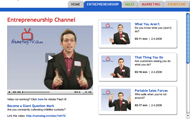 New website go live this week?
New website go live this week?
 Contrary to the actions of Will Ferrell, you don’t need to strip down buck nekkid and run around the room like a drunken maniac to steal the show.
Contrary to the actions of Will Ferrell, you don’t need to strip down buck nekkid and run around the room like a drunken maniac to steal the show.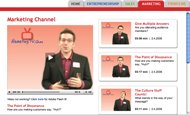
 The most important word in your entrepreneurial vocabulary is “next.”
The most important word in your entrepreneurial vocabulary is “next.”
 It’s amazing how quickly humility shows up when you’re incapacitated in a hospital bed for six days with a three-foot tube in your chest wacked out on morphine experiencing multiple anxiety attacks.
It’s amazing how quickly humility shows up when you’re incapacitated in a hospital bed for six days with a three-foot tube in your chest wacked out on morphine experiencing multiple anxiety attacks.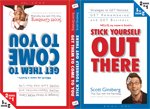 The world’s FIRST two-in-one, flip-flop book!
The world’s FIRST two-in-one, flip-flop book! Email spam – while annoying, unethical, sexually graphic and a colossal time waster – IS quite entertaining.
Email spam – while annoying, unethical, sexually graphic and a colossal time waster – IS quite entertaining.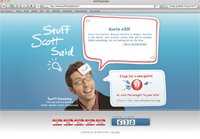 Who’s quoting YOU?
Who’s quoting YOU? 1. Don’t be a needle in a stack of needles. You will lose. And here’s why: Nobody notices normal, nobody buys boring and nobody pays for average. Period. Amen. Q.E.D. As such, your greatest barrier to business success isn’t a bad economy, stupidity, inexperience, or lack of funding – it’s anonymity.
1. Don’t be a needle in a stack of needles. You will lose. And here’s why: Nobody notices normal, nobody buys boring and nobody pays for average. Period. Amen. Q.E.D. As such, your greatest barrier to business success isn’t a bad economy, stupidity, inexperience, or lack of funding – it’s anonymity.  1. Ambiguity is opportunity in disguise. Love it. Welcome it. Embrace it. And know that NOT knowing paves the way for glorious and unimpeded progress. How do you act when faced with ambiguous situations?
1. Ambiguity is opportunity in disguise. Love it. Welcome it. Embrace it. And know that NOT knowing paves the way for glorious and unimpeded progress. How do you act when faced with ambiguous situations?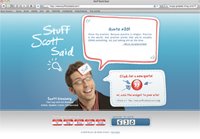 Who’s quoting YOU?
Who’s quoting YOU? An orbit is the gravitationally curved path of one object around a point or another body.
An orbit is the gravitationally curved path of one object around a point or another body. I was in the middle of yoga class when it happened.
I was in the middle of yoga class when it happened.